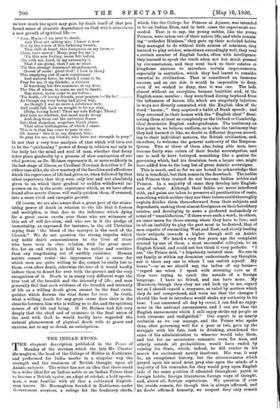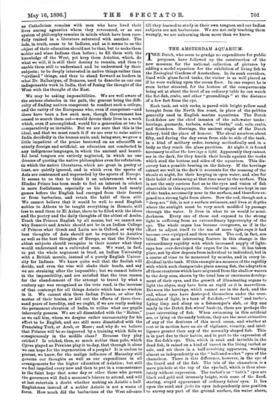THE INDIAN ETONS.
THE eloquent description published in the Times of Monday of the services which the late Mr. Chester Macnaghten, the head of the College of Nobles in Kattiawar, nad performed for India marks in a singular way the strength and the weakness of British thought upon all Asiatic subjects. The writer has not an idea that there could be a wider ideal for an Indian noble or an Indian Prince than to become a British squire, an adept at cricket, a bold sports- man, a man familiar with all that a cultivated English- man knows. Mr. Macnaghten founded in Kattiawar, under Government auspices, a college for the feudatory chiefs, which, like the College for Princes at Ajmere, was intended to be an Indian Eton, and in both cases the experiment sue• ceeded. That is to say, the young nobles, like the young Princes, were taken out of their native life, and while remain• ing "orthodox Hindoos," they gave up their secluded habits. they managed to do without little armies of retainers, they learned to play cricket, sometimes exceedingly well, they read a certain number of English books, often with intelligence, they learned to speak the truth when not too much pressed by circumstances, and they went back to their estates or kingdoms anxious to introduce certain improvements, especially in sanitation, which they had learnt to consider essential to civilisation. That is considered an immense success, and on one side it would be impossible to deny, even if we wished to deny, that it was one. The lads, almost without an exception, became healthier and, in the English sense, manlier• ; they were freed daring boyhood from the influences of harem life, which are singularly injurious in ways not directly connected with the English idea of the word " harem ; " they acquired a habit of frank speech ; and they returned to their homes with the "English ideal" domi- nating them at least as completely as the Oxford or Cambridge ideal dominates English undergraduates. The testimony on this point is, we believe, uniform, as is also the testimony that they had learned to like, no doubt in different degrees accord. ing to their individual natures, the British civilisation, and, therefore, to welcome the general authority of the Empress- Queen. Two or three of them also, being able men, have become fairly wise rulers of their feudal sovereignties, and one is said to have betrayed something like a genius for governing which, had his dominion been a larger one, might have added him to the long list of great Asiatic sovereigns.
This is much, and so far we are bound to acknowledge that this is beneficial, but then comes in the drawback. The nobles and Princes thus trained do not become Indian nobles and Princes. In a majority of cases they develop into English- men of colour. Although their faiths are never interfered with, and pains are taken to preserve all peculiarities of caste, something which neither they nor their tutors could thoroughly explain divides them thenceforward from their subjects and dependants, making them almost foreigners on their hereditary estates, and developing in some a profound melancholy or sense of " unsatisfaction," if there were such a word; in others, an inner scorn for those among whom they have to live; and in all an inability to play the part most to be desired, that of men capable of reconciling West and East, and slowly leading their subjects towards a higher though still an Asiatic civilisation. We heard a very few years ago the complaint uttered by one of them, a most successful collegian, to an English friend, and could not but think it very pathetic. "I am," the Prince said, " a hopelessly isolated man. No one in my family or within my dominion understands my thoughts, nor is there any one to whom I can unfold myself. My house "—or as we should say, the ladies of my house- " regard me when I speak with straining ears as if they were trying to catch the sounds of a foreign language. I have no friend, and can have none. My Ministers, though they obey me and look up to me, regard me as I should regard a sunyasee, as ruled by motives which they do not comprehend, and warn me that the changes I should like best to introduce would shake my authority to its base. I am consumed all day by ennui, I can find no enjoy- ment in the national amusements, and I can see that the English amusements which I still enjoy strike my people as both tiresome and undignified." Oar report is as nearly verbatim as we can manage, and the Prince who spoke thus, after governing well for a year or two, gave up the struggle with his fate, took to drinking, abandoned the reins of his administration to whoever would take them, and but for an occurrence romantic even for Asia, and utterly outside all probabilities, would have ended by ruining his State, which, indeed, he did render in his search for excitement nearly insolvent. His was, it may be, an exceptional history, but the circumstances which preyed upon his mind must prey also upon the minds of a majority of his comrades, for they would prey upon English lads of the same position if educated throughout youth in foreign habits, foreign literatures, foreign ways of thought, and, above all, foreign aspirations. We question if even the creeds remain, for though this is always affirmed, and no doubt affirmed honestly, we suspect they only remain
as Catholicism remains with men who have lived their lives among agnostics whom they reverenced, or as one system of philosophy remains in minds which have been care- fully trained in a literature saturated with another. The lads, in truth, cease to be Indians, and as it seems to us the object of their education should not be that but to make them 'nobler and wiser Indians than before ; to fill them with the knowledge of the West, yet keep them Asiatics, which, do what we will, it is still their destiny to remain, and thus to enable them still to understand and be understood by their subjects; to be deeply interested in native things rather than "civilised " things, and thus to stand forward as leaders in what Dr. Ballantyne, of Benares, used to describe as our one indispensable work in India, that of fusing the thought of the 'West with the thought of the East.
We may be asking impossibilities. We are well aware of 'the serious obstacles in the path, the gravest being the diffi- culty of finding natives competent to conduct such a college, and the rarity of the Europeans who, even if competent—and there have been a few such men, though Government has .ceased to search them out—would devote their lives to a work which, even if accomplished, would for a generation or two be comparatively so invisible. But we are sure that this is the ideal, and that we must reach it if we are ever to raise native India decidedly in the human scale, and, being sure, we grow a little impatient of the praise bestowed on an educatin so utterly foreign and artificial, an education not conducted in any indigenous languages, in which the ancient and beauti- ful local tongues are entirely neglected, in which no one dreams of quoting the native philosophies even for refutation, in which the native literatures, which are great in poetry at least, are quietly ignored, and in which even the sports of Asia are contemned and superseded by the sports of Europe. It seems to us that to think it an achievement when a Hindoo Prince has been made to feel an interest in cricket is mere foolishness, especially as his fathers had manly games before the English had emerged from their forests or from barbarism, and retain the habit of them still. We cannot believe that it would be well to send English nobles to Athena to be taught everything in Romaic, still less to send them to El Azhar, there to be filled with the ideas and the poetry and the daily thoughts of the ablest of Arabs. Teach the Princes English by all means, but we cannot see why Sanscrit and Arabic should not be in an Indian College of Princes what Greek and Latin are in Oxford, or why the best thoughts of Asia should not be repeated to Asiatics as well as the best thoughts of Europe, so that the Prince's ablest subjects should recognise in their master what they would understand as a cultivated man. We want, in fact, to put the whole argument in brief, an Indian University with a British morale, instead of a purely English Univer- sity for Indians. We know quite well that the foolish will .deride, and even the wise will shake their heads, and say we are straining after the impossible; but we cannot believe in the impossibility, and are satisfied that the true reason for the abandonment of the attempt to travel by what a century ago was recognised as the true road, is the increase of that contempt for all things Asiatic which has no wisdom in it. We cannot skin these Indian Princes, or alter the matter of their brains, or kill out the effects of three thou- cand years of heredity, and we ought, if we are really seeking the permanent elevation of India, to utilise what our pupils inherently possess. We are all dissatisfied with the " Baboo," as we call him, whom we despise rather unreasonably for his effort to be English, and are still more dissatisfied with the Francising Turk, or Arab, or Moor ; and why do we believe that Princes will be so improved by a training which fails so -conspicuously in the middle class ? Because they play cricket ? Is cricket, then, so much nobler than polo, which Cyrus played as Persians play it to-day, that through it alone we can hope for the regeneration of a people? It is useless to protest, we know, for the malign influence of Macaulay still governs our thoughts as well as our expenditure in all arrangements for the higher education of Asiatics ; but still we feel impelled every now and then to put in a remonstrance in the faint hope that some day or other those who govern the governors will find a moment's leisure to attend, and will at last entertain a doubt whether making an Asiatic a half- Englishman instead of a nobler Asiatic is not a waste of force. How much did the barbarians of the West advance
till they learned to study in their own tongues, and our Indian subjects are not barbarians. We are not only teaching them wrongly, we are unlearning them more than we know.







































 Previous page
Previous page